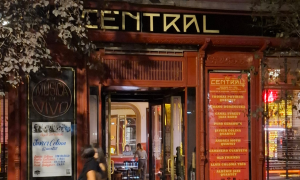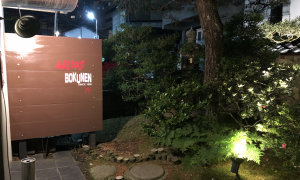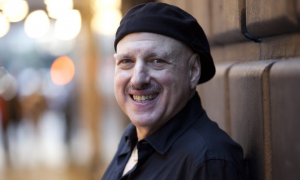Home » Jazz Articles » The Jazz Life » It's Not Your Fault—Just Evolve
It's Not Your Fault—Just Evolve

There's a difference between being 'good' at something, and sharing something of value with others.
—Christian Howes
Christian Howes is arguably one of America's finest jazz violinists, standing alongside past masters such as Joe Venuti, Stuff Smith, and John Blake. Many contemporary jazz violinists embrace a broad range of non-jazz styles as players because of choice or circumstance. They think of themselves as improvising violinists who play jazz. But like Jean-Luc Ponty before him, Chris thinks of himself as a jazz musician who happens to play the violin, and he has been acclaimed all over the world for it.
Despite all that, a number of years ago he chose to focus more on teaching than performing. To some it was as though Picasso or Mondrian had decided they'd rather teach than paint. Chris comes from a blue-collar background, and when he was young he spent four years in jail on drug charges. The experience, he told writer Isa Adney, was:
When I first read Chris's essay it immediately resonated with me. As a young, and ambitious musician I was lucky enough to study with saxophonist Warne Marsh. He helped me get my first apartment in New York, and the guy who was leasing it asked me in Warne's presence whether I was a jazz musician as well. I froze. Here I was in the company of one of the world's most original jazz musicians. How could I possibly say I was a jazz musician in his company? It felt both arrogant and frankly rude. So I hesitated to respond. And without batting an eye, Warne told me in front of this guy, "Sure, you're a jazz musician." It was like I'd received the Pope's blessing! And I'm not even Catholic.
Chris's essay touches on exactly that moment—something, if we're all honest, we have probably each experienced at least once, but have perhaps forgotten. Learning to forgive, but not ignore, our perceived shortcomings is something many of us too often forget. Perfectionism can be both a blessing and a curse.
—Peter Rubie
One of the most important lessons I ever learned came when my dad made me join cross-country at age 15. I was the slowest person on the team—so slow that the girls, who started their race minutes after us, would pass me. Despite all that, a number of years ago he chose to focus more on teaching than performing. To some it was as though Picasso or Mondrian had decided they'd rather teach than paint. Chris comes from a blue-collar background, and when he was young he spent four years in jail on drug charges. The experience, he told writer Isa Adney, was:
"just massive. It's traumatic, it's life changing... Every morning for those four years I woke up and asked myself: 'What can I do to make the most of my time to better myself?'
"Five years after I got out of jail, I was getting acclaim as being one of the top jazz violinists in the world... And I realized that acclaim plus five bucks will get you a latte at Starbucks. Because nobody cares, and nobody knows the difference anyway.
"Artists are sometimes trapped in their own prison of this idea of what it is to be an artist. You've got to get free of that. You've got to get free of your pride, you've got to get free of the story you tell yourself about what it means to be an artist.
"I never thought I was going to be a teacher. I thought real artists don't teach... And so I had to come to grips with that and be like, no, it's all about service. It's all about value, and to give that value however I can, while continuing to grow and while continuing to fuel whatever dream I have."
When I first read Chris's essay it immediately resonated with me. As a young, and ambitious musician I was lucky enough to study with saxophonist Warne Marsh. He helped me get my first apartment in New York, and the guy who was leasing it asked me in Warne's presence whether I was a jazz musician as well. I froze. Here I was in the company of one of the world's most original jazz musicians. How could I possibly say I was a jazz musician in his company? It felt both arrogant and frankly rude. So I hesitated to respond. And without batting an eye, Warne told me in front of this guy, "Sure, you're a jazz musician." It was like I'd received the Pope's blessing! And I'm not even Catholic.
Chris's essay touches on exactly that moment—something, if we're all honest, we have probably each experienced at least once, but have perhaps forgotten. Learning to forgive, but not ignore, our perceived shortcomings is something many of us too often forget. Perfectionism can be both a blessing and a curse.
—Peter Rubie
I was so slow that during a mile race, a runner lapped me. When my dad cheered from the stands to not let the guy lap me, I felt humiliated.
After that summer though, I learned an incredibly important lesson: I don't need to be "good" at something to enjoy it. To this day, running makes me happy. (Thanks, dad!)
But running is a solitary pursuit—it feels different than SHARING teaching or art with others. Because you want to share things with others only if they're valuable and relevant to them. You don't want to waste their time. And this creates a tremendous vulnerability and hesitance to share your work as a creator, performer, or teacher. You're likely to think you should only share work once it's good enough. And this keeps you from developing new skills— because you're not good at them YET.
But there's a difference between being "good" at something and sharing something of value with others.
Case in point: I'm not a consistently "good" writer. I struggle with the craft of writing. Yet some people (maybe you) take value from it.
I'm confident this is relevant to you because musicians and teachers are almost always specialists. For example, people with good ears aren't always good readers; some of the most adept concertmasters struggle to play a blues; seasoned classical teachers are often at a loss how to help their students compose or learn a different style of music.
But it's not your fault—you can evolve. Our narrow specialties and gaps in skills are a result of the culture of music education we grew up in, not inherent failings.
The biggest reason it's so hard for people who specialize to learn new facets of musicianship is, and I know this from having coached or taught thousands of players and teachers—a fear of not being good enough, mistaking being "good" with having value to give. This is especially a problem the more advanced you are in your area of specialty, because you're likely to associate your expertise with your worth, and any threat to the perception that you're a bulletproof all-round musician can feel unbearable. It's also why adult learners in my classes often do better initially than elite seasoned players. They are willing to try new things without needing to be good at them right away—kind of like I was forced to do with running.
Now, getting back to the idea of being "good" vs giving value: A 3-year old may not be a "good" violinist, but they have value to give. Just ask how it makes their mom feel when they play; Itzhak Perlman doesn't play as well as he used to. But he tells stories, plays a few passages. Similarly, the late alto saxophonist Lee Konitz also talked and sang or scatted on his gigs a lot more than he played as he aged from his '80s into his '90s. How they performed made people incredibly happy.
You are good at some things. You are less good at others. This will change and shift through life. We need to remind ourselves we're enough right now.
You can fill in the gaps in your skills later. If:
- It's important enough to you to get support and learn a structured way to improve your skills;
- You make your peace with the idea that it's ok not to be great at everything right away and respect your limits;
- So many of us are enticed into a false belief that good musicians are born with the ability to improvise, hear harmony, magically intuit how to play songs in styles they haven't practiced, or groove over grooves that are unfamiliar to them;
- Whatever your current level of ability, remember that if you play honestly what you have to offer has value.
I'm telling you this because I recently confronted all of this in myself when I grappled with my fear of writing. As I say, I'm not a great writer. It took being featured in the press for my writing to make me realize I can call myself a writer; and it's ok to not be as great at something as we want to be, even when we share our work with others.
I guess my Dad must have known that too.
Tags
PREVIOUS / NEXT
Support All About Jazz
 All About Jazz has been a pillar of jazz since 1995, championing it as an art form and, more importantly, supporting the musicians who make it. Our enduring commitment has made "AAJ" one of the most culturally important websites of its kind, read by hundreds of thousands of fans, musicians and industry figures every month.
All About Jazz has been a pillar of jazz since 1995, championing it as an art form and, more importantly, supporting the musicians who make it. Our enduring commitment has made "AAJ" one of the most culturally important websites of its kind, read by hundreds of thousands of fans, musicians and industry figures every month.
























